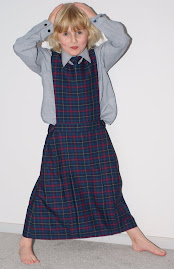In academic circles this debate is pretty much done and dusted. The debates tend to centre around how much the degree of nature or nurture has life-long effects on individuals. So I was interested to read a passage in our recent readings, title The Parental Fallacy, the following: "But never, ever could the state of your soul be attributed to what your mother or father did to you some thirty years ago!"
I believe this statement is false on several levels, firstly when talking about individuals is it not incredibly short-sighted or narrow minded to use the words "never, ever"? For me, this invalidates the statement straight away. Individuals are too varied to have a "one size fits all" blanket statement to ring true for all people. Secondly, overall I believe that what your parents do and say to you as a developing child, absorbing their knowledge in an unconditional, unequestioning way does leave impressions on our psyche.
So, I was quite interested when a fellow student started to discuss this reading and the "never, ever" statement was brought up. The view was that what our parents did to us thirty years ago was not a basis for any "blame" that may be attributed to them. I didn't think the statement was referring to "blame" and I said so, and asked questions about what she thought "state of soul" meant. I was genuinely interested in wanting to hear her views, as it was different from mine, and hence, the opportunity for me to learn where someone else is coming from. She insisted it was a "blaming" statement and when I brought up the effects of abuse, she still believed that a background of abuse or not, the parents still did not have any part to play in a child's actions or circumstances as an adult. Further enquiries about where she may have got some evidence or such to support her views, resulted in a quick dismissal of the conversation, with her walking off not giving any answers, and finishing with "I fully agree with that statement". End of story.
It was disappointing to see the conversation end as such, but it got me thinking about incidences in our childhood that could and I believe, do, leave us with physiological, biological and psychological hurdles to overcome if we do wish to make a good and happy life for ourselves as adults.
I'll start with the patriarchy style of parenting. It's a hard pill to swallow and quite sobering when a person comes to the conclusion that the majority of the behaviours, decisions, comments, values and beliefs instilled in one by one's parents are actually not made in the child's best interests. In all manner of growing up, there's a hidden agenda that girls are inferior to boys, should not be given the same treatment and that high levels of control are required for the girls while the boy-child is given and taught that he will achieve things with little effort. I have more than one friend who was denied a University education because of the father's attitude, "Oh, you'll only get married and have babies and do nothing more than that in your life." Her dreams of becoming a Doctor dashed at a very young age. Or the girl-child who's opinions are invalidated, told that she is too stupid to know anything about politics, while she watches her brother encouraged to speak up and express his views. The girl-child is told that she must learn how to cook, sew, knit, do washing and ironing and spend inordinate amounts of time on the weekend assisting with household chores, while her brothers spend time with Dad searching the car yards for their next acquisition. At the same time the girl-child is told that she is responsible for the behaviours of boys and men. For instance, she should not dress as to provoke looks from boys. She is responsible for being attacked if she's out at night-time waiting at a bus stop because she should never have been there. She should stay virginal until marriage but if this does not occur and she is violated against her will, it is her fault for attempting to seek a relationship with a boy in the first place. And she is told that the notion of living independently without a husband is "ridiculous and stupid." And what about the boy-child in these types of families? They are taught that they will marry and have rights, their wife will be their possession and will attend to all their domestic needs. The boys are shown by example and emphasised with words they are born with a right to authority and a sense of entitlement, regardless of how unrealistic this may be. And while these values, beliefs and actions are infiltrated into the children, there is a hidden agenda to further the father's role of authority within the family. He's the one that is in charge, and it is to be unquestioned.
So, I ask, in family roles such as this, what "state of soul" erupts from this type of environment? How far does it follow you into adulthood before you realise what the hidden agenda was? It has been my observation that the "patriarchal" style of parenting is believed not to exist by the majority of society, it is denied. So, if you were one of those that was brought up in such a manner, what does that say about your childhood? Are your experiences invalidated, did they not exist as per your own personal observations? If the adult-child, at 50, begins to question the values of the past, if the boy-adult's sense of entitlement has landed him in trouble with the law, or if the girl-adult's sense of playing 2nd best to her husband has left her bereft of any financial status at all, how much of "blame" is on the parents? None? I doubt it. But for many people, they believe this to be the case. I believe, the parents do shoulder some responsibility for their choices of how they conditioned their child to enter into the adult world. For the boys, the sense of entitlement is a state of their soul, and for the girls, the sense that they aren't important is a state of their soul. Can it be changed? I believe so, but it still has it's limitations, they may actually never be free from the limitations on the psych that the indoctrination of their childhood has left them with.
Secondly, I'll take a look at the "uninvolved" style of parenting, which was mentioned in the same article. It can fit in closely with the patriarchal one, in so much as that many behaviours, attitudes and child-rearing practices are in fact, centred around the interests of the parents, but cleverly disguised as being in the best interests of the child. These parents use guilt and shame as their major tools to show the child they really care, but they don't. Because attending a regular sport activity is bothersome for the parents, the minute something does not go right it's the best excuse they have to stop the activity. They will however, tell the child that ballet, or little athletics, or cricket is stopped because of the "nasty" people involved and that the child is best kept away from those "sorts". Hence, almost everything the child wants and looks forward to is unlikely to come to fruition. A long-term exposure to disappointments leaves an indelible mark on the child's soul. They begin to feel they are unworthy of anything, but they are told that it is in their best interests to not continue. School trips and camps provide the only relief for this parented child to achieve an outside activity, but when back home, the child is constantly told how "lovely" the house was without their presence. I've heard my friend's mother scream at her, "You ruined my life, I wish I never had you. Kids ruined everything I wanted to do." Hmmm, now are we going to say that exposure to this type of comment doesn't leave a long-term mark?
Last of all, there's the abusive type of parenting, not that to say the above three aren't abusive, they all are. So my reading has taken me to find Genie, the 1970's discovered 13 year old child, strapped on a potty chair and locked in a bare room for more than 12 years, every single day. Her story, you can Google "Genie abused child" and even find youtube videos that show her, is one of horrendous abuse, deprivation and neglect that's ever been seen in California. It's a tragic story, which has still not ended. And the fact that she never was able to learn grammar (due to synapses pruning in the brain at 6), and that she now lives in a home for retarded adults is testament, in the extreme, of how treatment by our parents can have irreversible life-long effects. Now, if anybody takes the time to read Genie's story, or the Trilogy by Dave Pelzer, A Boy Called It (referred to in this blog archives) and can see the long-term effects on the brain and the psyche of what abuse does, then they'd really appreciate that the statement "But never, ever could the state of your soul be attributed to what your mother or father did to you some thirty years ago!" Is a statement that could "never, ever" be true.
QotD: “Things went wrong the moment Blue decided to treat her fellow human
beings as depersonalized objects, and to let them treat her like an object
in turn”
-
Kathleen Stock (who I also quoted in my ‘The Dystopia of OnlyFans’ post)
has also written about the Bonnie Blue documentary; I would recommend
reading Stoc...
5 months ago




No comments:
Post a Comment